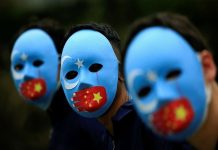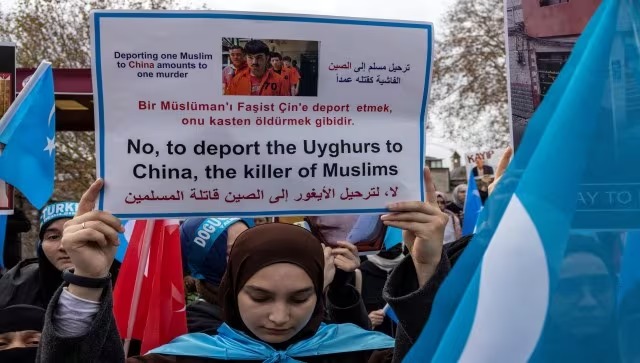In the last two decades or so, the white papers published by the State Council Information Office of the People’s Republic of China have become one of the prominent state-sponsored propaganda mechanisms of the Chinese government. Just within three weeks of the beginning of the new year (2024), on January 23, 2024, the State Council Information Office released a white paper titled “China’s Legal Framework and Measures for Counter Terrorism”.
This 22-page document comprises five sections, in addition to the preface and conclusion. At the outset, China described herself as a “victim of terrorism,” a card that it has been playing very astutely, particularly since the beginning of the Global War on Terrorism (GWOT) in October 2001.
China is perhaps one of the first countries to have joined the GWOT, and perhaps the only country in the world that has taken maximum mileage out of this by using its own “People’s War on Terror” against hapless minorities, especially Uyghurs and Tibetans.
This white paper emphatically claims, “China has found a path of law-based counterterrorism that conforms to its realities by establishing a sound legal framework, promoting strict, impartial, procedure-based law enforcement, and ensuring impartial administration of justice and effective protection of human rights.”
China does not fail to swear by the UN’s efforts to formulate some 13 global counterterrorism conventions since the 1960s and its unconditional support for these conventions since the late 1970s, besides making efforts to “build a domestic counterterrorism legal framework since the 1990s”. China vociferously claims that its Criminal Law, which was last amended in October 2021, was “part of China’s effort to implement UN Security Council Resolution 1373″.
It is important to highlight here that the Criminal Law in the last two decades has been amended over half a dozen times (1997, 2001, 2006, 2012, 2015, and 2018), catering fully to its designs against the people who are dubbed anti-state, anti-national, and anti-Chinese.
It gives sufficient justifications for the adoption of laws like the Decision on Issues Related to Strengthening Counterterrorism Work (October 2011) and the Counterterrorism Law (December 27, 2015, amended further in April 2018).
Since its implementation in 2016, the Counterterrorism Law has been made the “centrepiece” of China’s Counter terrorism Legal Framework. For instance, the Counterterrorism Law’s local version in Xinjiang (The Counterterrorism Law and the Regulations of Xinjiang Uygur Autonomous Region on Deradicalisation) has become a tool against ethnic minorities, especially Uyghurs.
Surprisingly, the white paper strongly defends the legal provisions adopted by the Central government. For example, there is effusive praise for the judicial mechanisms, law-making, and enforcement arms of the government for implementing the laws in their letter and spirit.
Further, the paper claims that “under the principle of legality, no one should be convicted of a terrorist crime for any reason if there are no explicit provisions in law.” However, the reports of several international agencies, bodies, and organisations have clearly stated that in the last few years, many Uyghurs have been detained for no fault or reason and are subjected to immeasurable atrocities.
The claims that the law enforcement agencies follow “statutory principles,” pursue the “principle of proportionality,” and put in place a strict “accountability system” are utter lies and a mere eyewash.
Furthermore, the claim that “judicial administrative agencies have ensured transparency in prison affairs” is not true, as the Chinese government is yet to come clean in the case of the imprisonment of over a million Uyghurs in the so-called vocational training centres across Xinjiang, which the international community dubs as internment camps.
The most important section of this white paper is Section IV (Protection of Human Rights in Counterterrorism Practices), which states that “China respects and protects human rights as an underlying principle in improving its legal framework and practices in the field of counterterrorism”.
It is important to highlight herewith that while assessing the human rights situation in Xinjiang, the UN in August 2022 dubbed the Chinese excesses against the Uyghurs in Xinjiang as “crimes against humanity”.
The claim that China “gives equal weight to safeguarding the basic rights of citizens” and provides a “guard against discrimination based on geographical area, ethnic group, or religion” is just the opposite of its actions against Uyghurs in Xinjiang and Tibetans.
Even though China’s Constitution and laws specify that “citizens’ personal freedom and dignity shall not be violated,” as reiterated in this white paper, the individual freedom and dignity of Uyghurs in China have been blatantly violated.
Further, China’s Constitution and laws grant citizens of all ethnic groups the right to use their own language in court proceedings, as the white paper describes. However, the truth is entirely different.
The Chinese government has been pursuing a policy of prioritising the Mandarin language over ethnic languages, even at the primary school level. The forcible promotion of Mandarin Chinese over ethnic languages in Xinjiang has hampered these languages as well as the linguistic identity of the minority people.
The brazen description that “prisons provide cultural, legal, and technical education to increase offenders’ knowledge, skills, and employability” supports the Chinese action to imprison millions of minority people in Xinjiang.
“China has heightened the people’s sense of security, defended national security, and contributed to regional and global security and stability,” the white paper claims. It is a vulgar display of “hardcore realism,” which China pursues by putting its national interest above anything else.
The Chinese government has not failed to showcase the developments done in Xinjiang, the standard of living of the local ethnic people, tourism development, etc., just to send the message to the global community that ‘all is well’ in Xinjiang.
At the end, the Chinese government gives a clarion call that “in fighting terrorism, the international community should support diverse law-based actions, reject double standards, and oppose the politicisation of related issues.” However, the Chinese government does not do what it professes. Its “double standards” on terrorist Maulana Masud Azhar, silence on the Hamas terrorist attack on Israel, and the Houthis in the Red Sea are widely known across the globe.
This white paper is yet another state-sponsored document by the Chinese government to defend its activities and policies towards Uyghurs in Xinjiang under the garb of counterterrorism.

































